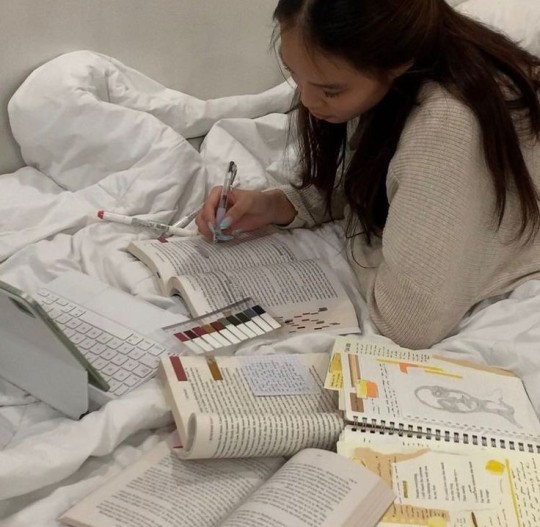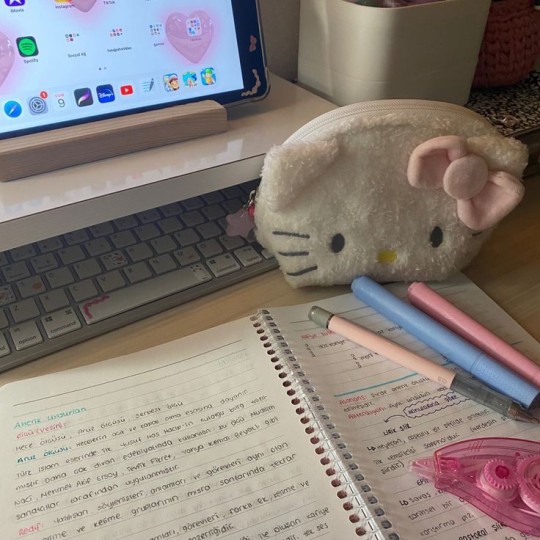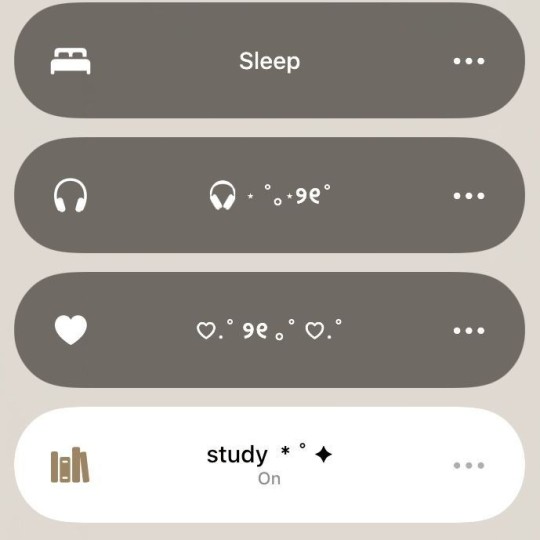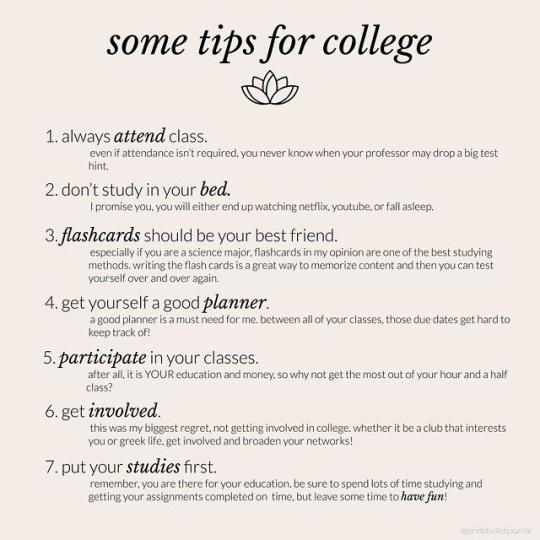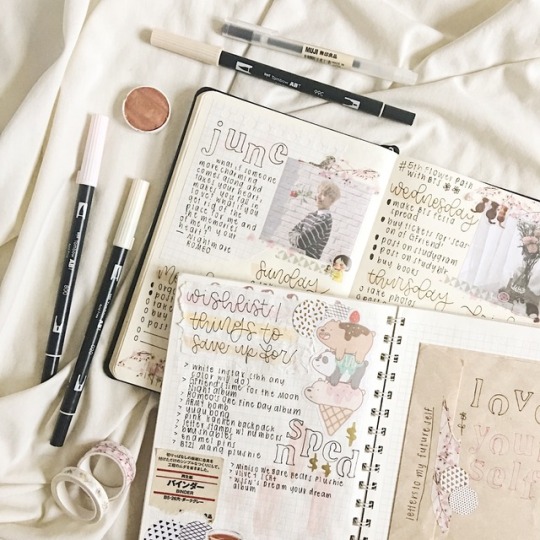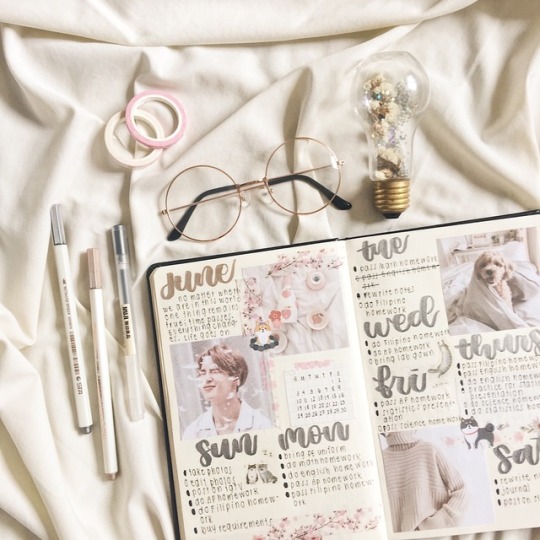Text
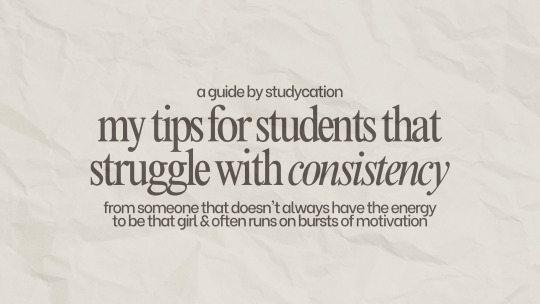
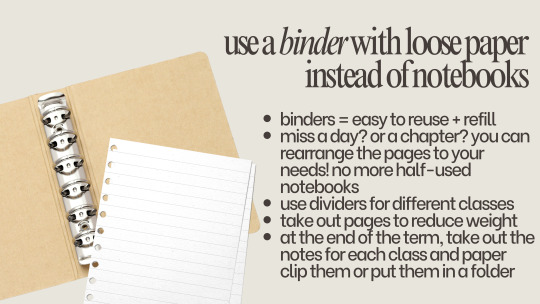
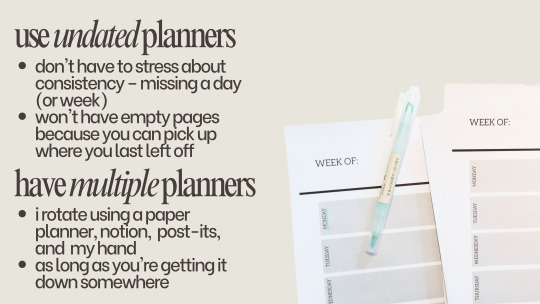
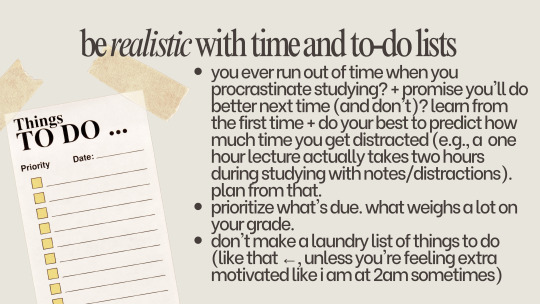
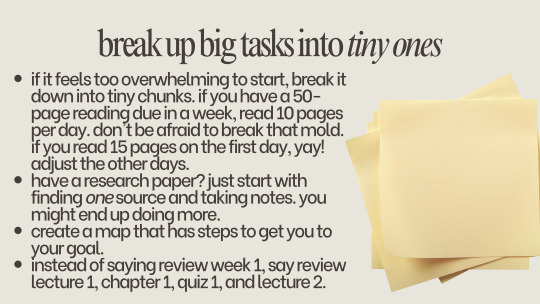
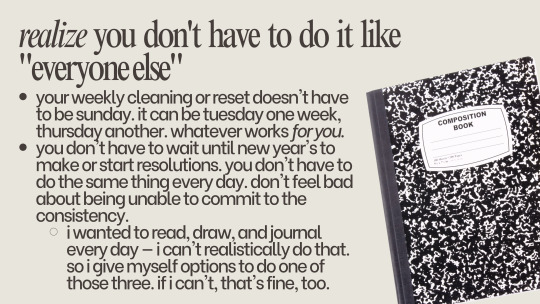
my tips for students that struggle with consistency
4K notes
·
View notes
Text
i graduated! #life-update
so.. it’s been a good 6-7 years since I was active here. I thought i’d check back here and it was so heartwarming to see some of you guys still reblogging and liking my notes from high school :,) brings back loads of memories..
what have I been up to? life happened. I had a crazy past few years - ended up unexpectedly doing a tech degree in university (yay women in STEM!), started my own small business after the pandemic, had a couple fulfilling internships and finally graduated! I started my job as a software engineer just a week ago.
looking back, studyblr had not only served as a motivation for me to study and write pretty notes, but it was heartening to be spreading positivity and inspiration to many like-minded individuals here. i am truly grateful for all the love i received and also the support we had for each other in this community.
not sure if the studyblr community still exists now, but i just wanted to say that i am so so glad that my resources have reached so many of you, hopefully they have managed to provide some help, inspiration or motivation. keep up the amazing work you guys, push through and trust the process! everything will work out in the craziest ways possible!
ciao for now ;) let a new chapter begin!
p.s. please don’t hesitate to connect with me :)
3 notes
·
View notes
Photo
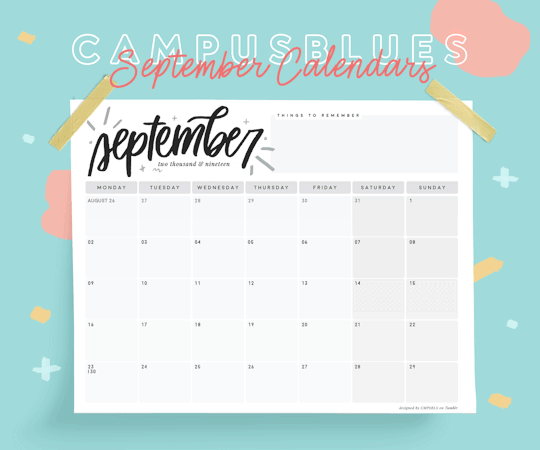
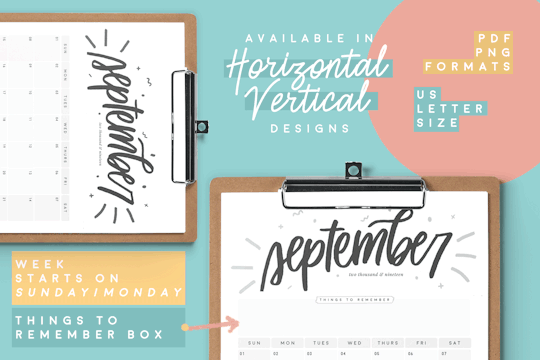
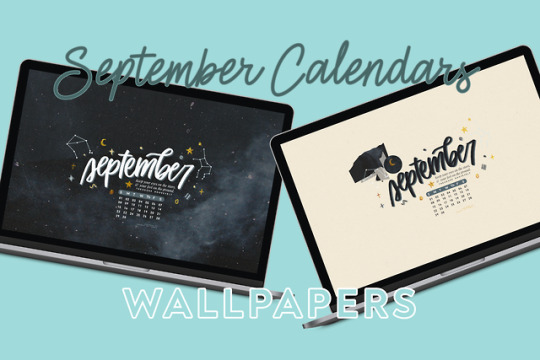
HELLO EVERYONE!! ∩(︶▽︶)∩ School starts next week and I wanted to use my remaining life freedom days to make some printables/desktop wallpapers (◡‿◡✿) so here are the september calendars and desktop wallpapers
FEATURES
You can choose between calendars that start on Monday (August 26) or Sunday (September 1)
Horizontal or Vertical layouts available
Option to have a “Things to Remember” box or not
AVAILABLE IN FOUR COLORS!!!! (◕‿◕✿) Black, Pink, Blue, Yellow (just check out the folders to see them!)
SEPTEMBER CALENDARS
HORIZONTAL Variation: Monday | Sunday
VERTICAL Variation: Monday | Sunday
SEPTEMBER WALLPAPERS (ꈍ ᴗ ꈍ✿)
I plan to drop more printables soon (besides the oct,nov, dec cals) so u can drop by for suggestions or notes to make my printables better! ー( ´ ▽ ` )ノ
✿Note: you may edit the wallpaper or my calendars but pls dont remove the credit, also pls tag me at #CMPSBLS if you use my printables so I can reblog it and so I can thank you personally ✲゚。(✿╹◡╹)ノ☆.₀:*゚✲゚*
1K notes
·
View notes
Text
20 Common Interview Questions, What They Really Mean, and How to Smartly Answer Them
This is a sheet given to me by my college’s business department and I thought it was helpful so I’ve typed it up fr you guys. All credits to my college business department.
1. Tell me about yourself. What it means: What are your career goals for the next 1-3 years/5-10 years?
This question might come in different forms, but it is the most often asked question in interviews, especially at the start. Have a short statement prepared that describes a little about your past, a lot about your present, and a little about your future that essentially answers the question, “Why are we sitting across from each other and talking today?” Be careful that it does not sound rehearsed and be sure you sound excited about the opportunity and fully engaged. Limit your answer to relevance with the interview. Talk about things you have done that relate to the position you are interviewing for and show strategy in your thinking that led you to this interview. Start with the item farthest back, work up to the present and touch on the future. Let the recruiter know how this position ties into the career map you have planned. Set the footing to shift from a mundane interview into impactful dialogue.
2. How did you choose this line of work?
They are looking for people who are strategic and apply critical thinking to decisions. Have a good answer ready, showing passion for the field.
3. Why did you leave your last job? or Why do you want to leave your job? or What did you enjoy/not enjoy about your last job?
Stay positive regardless of the circumstances. Don’t refer to a major problem with management and never speak ill of supervisors, co-workers or the company. If you do, you will be sullied. Keep smiling and talk about leaving for a hopeful, forward-looking reason (i.e. chance to make an impact, use skills, etc.).
4. What experience do you have in this field? or Why should we hire you? or Give me an example from your experience or education that shows your readiness for this role.
Speak about specifics that relate to the position for which you are applying. If you do not have specific experience, get as close as you can (aka make it up). It is critical that you prepare by unpacking your brain, and know how to tie your experiences/skills to the position description. Give them your best pitch and smile!
5. What do co-workers/former employers say about you?
Be prepared with a quote or two. Either a specific statement or a paraphrase will work. “Jamal Clark, a colleague at Smith Company, always said I was the hardest worker he’d ever known.” It is as powerful as Jamal saying it at the interview himself. Trouble answering this? Ask former colleagues and professional friends for their opinions!
6. What do you know about our firm? or Why do you want to work for us? Or Why do you want the job?
These questions are the primary reason to do research on the organization before the interview. Find out where they have been and where they are going. What are the current issues? Who are the major players? Can you get behind their mission? Crucial research includes reviewing their “About Us” webpages, googling current events where they were involved, and looking on Glassdoor.com to get the scoop on positive things their employees are saying. This takes thought and should be based on the research you have done on the organization as a whole plus a mention of the specific position. Know that job description very well! Sincerity is extremely important. Relate response to long-term career goals. A flat answer here may end the interview, so be prepared.
7. What kind of salary do you need?
It’s a loaded question and a thorny game that you will probably lose if you answer first. So, try not to answer it. Instead, consider discussing how the experience this opportunity offers is the main compensation you are seeking. Or, if you want the conversation to unfold, try, “What is the pay range someone with my skill set and degree could expect for this position?” In some cases, the interviewer will tell you. If not, say that it can depend on the details of the job and ask if you can discuss at a later stage in the interviewing process so you more fully understand the responsibilities of the position. If the interviewer presses, be sure you have done your research on appropriate salaries and give a $7k pay range that makes sense for your lifestyle, your experience, your location, and the position. Use salary.com, Glassdoor.com and Bureau of Labor Statistics to do your research.
8. Provide an example of your ability to think quickly and clearly on your feet.
Companies are looking for innovative thinkers who do not need to be coddled and who truly are up to the challenges of business, most of which require timely, analytical, and creative people. Have a robust STAR** story ready to address this question.
9. Tell me about a time when you helped get a team focused and led them to success.
You are, of course, a team player, right? Be sure to have examples ready: specific stories that show you often perform for the good of the team rather than for personal success are good evidence of your team attitude. Do not brag; just say it in a matter-of-fact tone. This is a key point. Use the STAR** method to stay focused and provide a thorough reply.
10. Are you applying for other jobs?
Be honest but do not spend a lot of time in this area. Keep the focus on this job and what you can do for this organization. Anything else is a distraction.
11. Have you ever been asked to leave a position? I
f you have not, say no. If you have, be honest, be brief and avoid saying negative things about yourself, the people or organization involved. Find the positive spin.
12. What is your greatest strength? Follow Up: Tell me about a time when this professional strength made the difference between success and failure.
Numerous answers are good, just stay optimistic and truthful. A few good examples: ability to prioritize, work under pressure, solve problems or focus on projects, perhaps professional expertise, leadership skills, positive attitude, reporting skills… but be able to prove your reply with a STAR** story.
13. What kind of person would you refuse to work with?
Do not be trivial. It should take disloyalty to the organization, violence, or criminal behavior to get you to refuse to work with a colleague. Minor objections may label you as a whiner. If the version of this question is, “What type of person do you prefer not to work with?”, again don’t be trivial, lengthy, or negative. Focus on discussing your ability to work well with just about anyone.
14. Tell me about a time when you had an idea to improve a process.
They are looking to see that you can (a) take enough ownership to even think about improvements, (b) think creatively and challenge norms, © present enhancements to others with emotionally intelligence, and (d) consider risks of change. Have a great STAR** story!
15. Tell me about a problem you had with a supervisor.
This is a test - If you fall for it and start tearing up an old boss, you failed. Stay positive and either reply that you have not had any trouble with a supervisor if that’s the case, or provide a short STAR** story about how you constructively worked to solve the issue and how your relationship was strengthened as a result. Focus on the happy result!
16. What motivates you to do your best on the job? or What do you expect from your employer?
This is personal - be accurate and honest, yet relevant to the job - but examples for motivation are: Challenge, Achievement, Recognition, Positive Impact, Helping Others. For expectations, you can discuss motivation first and then add something like, “I expect that my employer will communicate her needs clearly so I can drive toward strong results.” Add anything you deem fitting here, but avoid coming off as entitled or high maintenance.
17. Do you have any blind spots or weaknesses?
Tricky question - Do not reveal personal areas of concern but focus on how you want to grow professionally. In discussing weakness, focus on the BUT, i.e. “In the past I have put a lot of pressure on myself, but I have been overcoming that as my skills sharpen and challenges lessen.”
18. Tell me about a time that you had to analyze several solutions to make a sound decision.
This question dives into the ability to create a framework for strategic thinking and proves you have a set process to make good decisions. Tell a STAR** story where the situation is not simple and you can give specifics on the pros and cons assessed, the sources of information tapped into, the info gathered, and insights made to come to a conclusion.
19. How do you stay organized?
Attending to details, planning, organizing, and prioritizing work takes skill. Talk about how you manage your life or work using specific methods, as well as tools you use. You can even provide a STAR** story that speaks to how these qualities led to a success at some point in your life, career, or education.
20. What questions do you have for me?
Interviews should go both ways. Have about 5 good questions ready to ask so you can gather the information you need to make a well-informed decision. These questions should be informational in nature and allow you to understand the position and company better while reinforcing your interest and enthusiasm. This is not a good time to talk about benefits, pay, etc. That info will come in time.
**The STAR Technique is a way to frame answers to behavioral questions in an organized manner that will give the interviewer the most information about your past experience. (This is the part where the paper says to have at least 10 of these ready but I think that’s insane. Have a couple and be prepared to tweak them based on the question. Don’t use the same few for the same interview. i’d say having about 3-5 ready is good enough.) As you prepare to answer each question, organize your response for clarity by answering each of the following components of the STAR technique:
What was the Situation in which you were involved?
What was the Task you needed to accomplish?
What Actions did you take?
What Results did you achieve?
IMPORTANT TIPS: Give a good amount of detail to paint a very clear picture at each step, focus on YOU versus the group, and if the Result wasn’t very positive or does not place you in a great light, that it is not interview material!
20K notes
·
View notes
Text
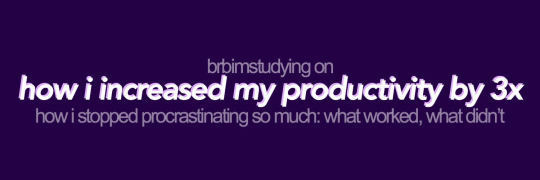
i’ve been really productive the past few months, which is actually quite rare for me bc i’m a slave to procrastination i get burnt out v easily. this time was a little different, i managed to keep my productivity levels really high for a whole 2 months all the way until exams ended, studying every single day without fail, around 10 hours a day, when i used to only do an average of 3 or 4. so here’s what worked for me and what didn’t!
what works: schedule your day
what happens when ur a virgo studyblr? u plan. i would write out everything i needed to accomplish for the day, the night before, and be really specific about it. i would then plug in the timings, this works for me, but u can choose to put the time in first and plan what u want to do around the time.
a structured time plan pressures me and i end up getting everything done, especially when i set an alarm on my phone for all the timings!
what does not: cramming a lot of hours into a day
12+ hour work days are ideal, especially when u watch all the ‘study with me: 14 hour work day!’ youtube videos, but they are just tedious and unreasonable.
let’s face it, even if u do complete one or two long study days, ur just gonna get bored and tired and have no mood to continuing this for a week or more. slow and steady wins the race!
what works: tweaking the pomodoro technique
i hate the pomodoro method. at the 25 minute mark, i’m normally on a roll and super focused on the task; and the 5 minute breaks were too short for me to actually take a break.
that’s why i tweaked it to 45-minute study sessions with 10-minute breaks, and after 3 study sessions, a 30-minute break. longer study sessions meant i get a break when i really start to get restless, and longer breaks gave me more time to recharge. i suggest tweaking this to match what works for you.
what does not work; doing too many / too little subjects a day
1. u don’t want to cram all the same topics and subjects into one day. ultimately, it’s a choice of spending 8 hours solely on a subject / topic and not touching it for the next few days / weeks, OR doing just 2 or 3 hours of one subject / topic each day over a few days / week
2. just thinking about doing only one subject for a whole day already tires me out. i have tried it, but normally i get so sick and tired of it that after a few hours, i can’t bring myself to focus on it any longer. on the contrary, if i keep switching between subjects, i get super confused because i have to remember too much of very different info.
what works: leaving the last portion of your day ambiguous
i like to start and end my days early. but in the process, i found a benefit of ending them early: i end up w a chunk of time at the end where there are two scenarios:
i’m super motivated and want to continue studying
i’m rly tired and cannot bring myself to continue bc i need a break !1!!
surprisingly, option 1 does happen a lot. and i think this is a rly good work-life balance. u don’t get burnt out easily, but from time to time, u get a bonus extra few hours of work done!
what does not work: forgoing sleep
sleep is so important omg. 3 hours of studying while sleepy = 1 hour of studying when ur refreshed and ur brain’s working. a tired mind is a slow mind, and an awake mind is a fast mind!
do not worry about that rly hard chapter that u must understand and complete! ur mind continue to works even when ur sleeping, i assume bc it’s rewiring and sorting through new information. after waking up, i find myself being able to better remember and understand information that i struggled on the night before!
what works: finding out ur energy levels and use it to ur advantage
some people work best at 6am and can’t focus after 9pm, some people can’t focus before 11am and work best at midnight. take note of and chart ur energy levels throughout the day for about a week or so, are u particularly refreshed in the morning? do u feel urself always dozing off at 4? are u the most productive at night?
work ur body clock out and work around it! every body functions differently! like in the last point, 3 hours of studying at ur worst energy levels = 1 hour of studying at ur peak energy level! forcing urself to work when ur body refuses to do so will only lead to procrastination.
i sincerely hope these few tips can help u out w being productive! what are some of the things u do to get shit done?
11K notes
·
View notes
Text
little happy things:
seeing someone who is equally as excited to see you
when you’re somewhere beautiful, away from things that stress you out
actually completing your homework quickly without procrastinating too much, and then sleeping on time
when your friend shares a generous amount of food with you
reading something that perfectly describes what you’ve struggled to put into words
starting a new journal with new stationery
waking up in the morning and feeling happy for no reason
discovering a new favourite tv show, song or person that makes you excited again
making food or art and then feeling proud of your creations
realizing that you don’t care anymore about something that made you sad or anxious before
116K notes
·
View notes
Text
Things NOT To Do When Studying
I was going through some old papers from freshman year and I was thinking about what I was doing wrong when I didn’t achieve the grades I wanted, even though I got As in my classes. What things could I have done better to get a 100 instead of a 96? I don’t ask myself this so much as to be a perfectionist (even though I am one). I ask myself these questions because: 1) I must not have had a completely solid understanding of the material if I couldn’t get a 100 on it. 2) Maybe my less-than-stellar test-taking skills got in the way. 3) I’m a tutor, so I want to be sure I understand everything thoroughly enough to help others with the material.
I may add to this later, so you can always check out the original post here. As always, feel free to comment or message me if you want to add something to this list!
General:
Don’t simply read over your notes to study. It doesn’t work. You might pick up pieces here and there or even memorize certain things verbatim, but reading something 20 times is very inefficient. Your brain learns by making connections, so if you’re only straight reading the material you’re not making extra connections. You’re much better off going through your notes to make your own questions and quizzing yourself on them, marking down connections as you read (either in the margin or by literally connecting them in the text with a pen), or creating a study sheet (whether in text format or a mind map).
Don’t simply highlight, either. While there is a proper way to highlight, most people I see using a highlighter are doing it wrong. If you’re the person who highlights 90% of the paragraph, I’m talking about you. Okay, so highlighting is physically more active than glancing over your notes 20 times, but it’s about equally as effective if you’re highlighting everything. I recommend instead highlighting (or marking with eraseable pencil) things you want to go back to later. But, again, highlighting and reading alone is not useful. Go back to your highlighted parts to reread something that was hard to understand the first time, a topic you want to revisit to make a review sheet, etc. Whatever you use it for, make sure the purpose is to quickly find information later, not simply so you can read those things again. Try making a study sheet, in your own words, based off of your highlighting.
Don’t forget to write things down. And I don’t mean just in your planner when you have homework or papers due. This isn’t so much about getting absolutely everything down in terms of notes, either, I have a separate post regarding that. But in class you should always write down questions you have and the answer. If you don’t get a chance to ask during class, ask ASAP whether it’s directly to your teacher or asking a classmate. If it’s that important, do some research on it, too. Also, make sure you write down information on due dates or paper topics. You probably already do that, but I would recommend having a piece of paper with you every day where you can write anything important down like dates and to-dos to organize all in one shot. If you simply write down “paper due” in a block in your planner before rushing to the next you may not see that reminder until close to the due date. I like to take all of the information on the piece of paper (which also has my day planned out and a to-do list) right when I get up in the morning so I’m prepared for the day and don’t forget anything.
What I Did Wrong:
Don’t take it easy at the start of the semester. To be perfectly honest, I’ve pretty much always done that, but my freshman year of college it wasn’t a huge deal since I pretty much already took those classes. Sophomore year, however, everything was new, so memorization and understanding didn’t come quite as easily. The harder your classes are, the more essential this is, especially if you actually want to sleep during finals week. The best thing you can do is start doing work before the semester even starts if you have a syllabus handy, or even just looking through your books to see what’s ahead. While everyone else is doing fun things the night of that first day, make sure you get some work done first before you have your fun. This sets the tone for the rest of the semester and gets you into the habit of working. Don’t let yourself get behind! It’s easier to stay ahead than it is to struggle catching up.
Don’t leave your notes to rot after class. Meaning, do something with them right after class! … or at least ASAP. Mark them up, edit them, rework them, copy or type them (if your handwriting sucks like me), or, best of all, write a short summary. Take the several pages of notes you have and condense them into one or two paragraphs. Don’t worry about the details, just make sure you’re hitting on the key points. As a bonus, you can type up some questions based off of your notes to save for later studying (details are allowed here). Everything will be fresh, making this a much easier process than if you did it right before the test. At the end of the week, make a summary of your summaries and quiz yourself on the questions you made. You’ll probably want to use those questions again, so try to reword them or even combine them into bigger questions that cover many topics. That way you’re being active with the material and will actually understand what you’re answering as opposed to parroting.
Don’t make study sheets by copying off of something else. Yes, I made this mistake. I wasn’t copying initially, but rather, using a review book as a reference to make study sheets. However, the more I was pressed for time the less I started putting things into my own words. Now, this wasn’t a big deal in terms of legality, since I kept them to myself, but it didn’t turn out to be all that helpful in the end. If you want to make study sheets, you could either take concepts you’ve been learning and put them together in different ways or make a summary in your own words. I recommend both, but whatever you do, make sure you’re actually creating something new or else you’re not going to remember it. For example, in organic chemistry I took the reactions and grouped them in different ways (by subtstrate, reactants, products, etc.) as a reference while studying. The act of sorting and looking through the reactions in order to make the sheets helped me remember them, then I had the sheets to look at while doing practice to help me memorize them further.
Don’t save the bulk of lab work for after the lab and don’t wait to write your report. By this I’m referring to the post-lab report. Spend the extra time while prepping your pre-lab materials to start your report! You’re expected to know the theory behind your labs before you perform them, so writing the introduction to your report should not be a problem. If it is, then you’ll be glad you took the time to understand the lab before you tried actually doing it. By doing this you may also find that you have questions that can be answered by the professor before you get confused in the middle of a procedure. Also make sure you have data tables prepared (not just in your notebook, but in the report file to fill in after) and anything else you’ll need to take down data. Once the lab is finished do the report immediately. Everything you did will be fresh and you’ll be glad you finished it well ahead of the deadline. At this point you can show your lab to your professor and get any corrections fixed so you’re ashooin’ for an A!
Don’t try to write a paper in one shot. I understand if you feel like your papers flow better if you do it all in one shot, but at least make sure you plan it out thoroughly ahead of time before you actually write it all out. But even then, you will likely benefit from splitting your paper into chunks to tackle one day at a time. If you have a research paper that’s double-digit pages then you’ll be forced to do that anyway, but be sure you’re splitting up the work for small papers, as well. It may not seem like a big deal to do a short paper in one day, but if you end up having other assignments or tests due around the same time it might up your stress if you’re crunched for time trying to finish that “insignificant” paper while juggling a few other assignments as well as some test prep.
Advice Suggested By Others:
Don’t listen to distracting music while studying. To some degree, the types of music that are considered “distracting” vary when it comes to the subject you’re studying and personal preference. However, the general rule of thumb is that you avoid any sort of music with lyrics if you’re studying a subject that involves language. Art, math, and certain sciences are an exception if you’re working with pictures or numbers, since language usually doesn’t interfere with those things in the brain. But if you’re reading anything, even if it’s worded directions to a math or science problem, lyrics will probably be distracting. Some people suggest that listening to new music with lyrics is okay because you won’t be tempted to sing along with something you don’t know while others get distracted by hearing any type of language. Again, it’s truly up to you, but genres such as classical, jazz, and nature sounds are usually recommended. Heck, if you’re a musician and get distracted by any type of music, silence or brown noise may be the better option for you. (Suggested by aslongasitsfiction)
Don’t study in bed. Scientific studies have shown that doing anything in your bed that isn’t sleep or sex-related affects your ability to fall asleep in your bed. When your brain primarily associates your bed with sleep, it’s much easier to fall asleep. But having trouble sleeping in your bed isn’t the only part of the problem. While studying in your bed is really comfy, you’re also more likely to fall asleep if the association with sleep is strong enough. It’s generally recommended that you don’t even study in the same room as your bed, but as college students this may not be possible if you want to use your desk. So if you don’t want to make the trek out to a more secluded study space, at least try to make sure your desk doesn’t have your bed in view. Because let’s be honest, if you’re exhausted, simply seeing your bed might be enough to make you nod off. (Suggested by rare-footage and ane-mia)
Don’t go on tumblr. Okay, this may seem obvious, but sometimes a reminder is all you need to get off your computer! I suppose it’s better that you’re looking up information to help you study, but I think we both know what the better choice would be. (Suggested by oneofakindgizibe)
Don’t study in a place you can’t focus just because your friends are there. Us humans are social animals. We like being around other people. But this can cause you problems if you’re trying to study. Unless you’re in a productive study group, make sure you separate study time and social time. You’re probably more likely to gravitate towards fun, social things over studying, so make sure studying is a priority and you get it done before seeing your friends. If you have a roommate or two, then your dorm room is probably not the right place to study. Find a few of your focus hotspots and go there for your study time. (Suggested by fitspoforever)
Don’t forget the little things you know you’ll need. This includes but is not limited to things such as chargers, books, snacks, and water. You don’t want to be in-the-zone and all of the sudden realize you need to run back to your dorm room to get a book. And then 10 minutes later realize you’re hungry and need to run to the cafeteria. If you don’t already have certain things that are always in your bag, simply keep a list of things you generally need to bring with you, leave it as a reminder on your desk, and check it over before you hit the library. (Suggested by fitspoforever)
Don’t take naps while studying without setting an alarm. Or even better, avoid naps all together. If you’re like me, 15-minute naps usually turn into 2-hour events. But regardless, if you need to get some extra sleep, get the extra sleep. It’s better to take a nap when you know you need it as opposed to falling asleep on your desk unexpectedly when you have a paper you need to get done for the next day. 15-20 minutes the recommended time for a short nap, but if you need something more robust, try for 90 minutes or use sleepyti.me to figure out the right time to wake up. (Suggested by fitspoforever)
Don’t wear uncomfortable clothes. I personally find that “dressing for success” works really well for going to lectures and virtually everything else, but terribly if you’re hitting the library for a long study session. You’ll probably wanna look cute if you’re heading somewhere public, but just make sure you’re comfortable. Yoga pants are fine for the occasion! (Suggested by fitspoforever)
21K notes
·
View notes
Text
College Note-Taking System
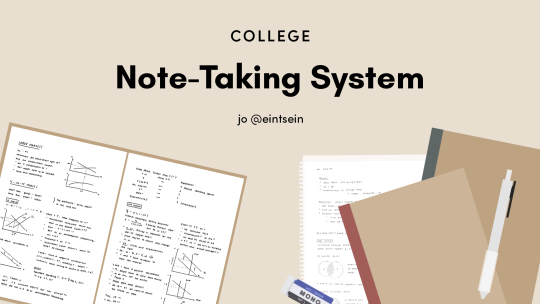
Having cohesive and effective notes is one of the key skills I think one should have, especially in an academic setting. When you’re receiving a ton of information each day, you want to be able to keep track of that and remember what you’ve learned. I’m constantly trying out ways to make my note-taking more effective and tailored to my needs. Here’s what my note-taking system looks like so far.
Quick note: click on the images for better quality!
Class Notes
Taking notes in class is an invaluable way to keep track of the new knowledge you’ve gained. However, depending on the mode in which the lecture material is conveyed, I take my notes differently. Here’s a summary of how I take my notes for each type of lecture, as well as some examples from the classes I’m taking now.
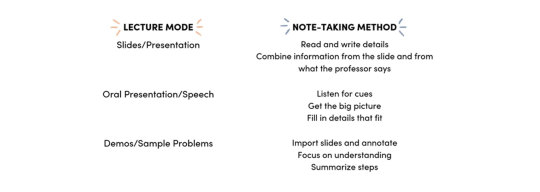
Slides (e.g. Macroeconomics)
Macroeconomics is a class in which you should be able to intuitively understand a lot of concepts but also remember a lot of things. Because of this, I’ve tailored my note-taking method and habits to achieve that goal.
I write my notes by hand because handwriting is more effective in committing things to memory.
As for what I actually do - and this is what I’ve done for other classes in which the professor/lecturer uses slides:
Read/skim over the slide.
Read each bullet point as the professor goes through them.
Copy it down if it’s straightforward or write it down in a structure and diction that I understand better (not necessarily in my own words - sometimes it’s just restructuring, e.g. splitting things up or joining different bullet points together).
Take note of any other important details the professor says about any particular point unless I think it’s intuitive or common sense.
Here’s an example from a Macroeconomics lecture.
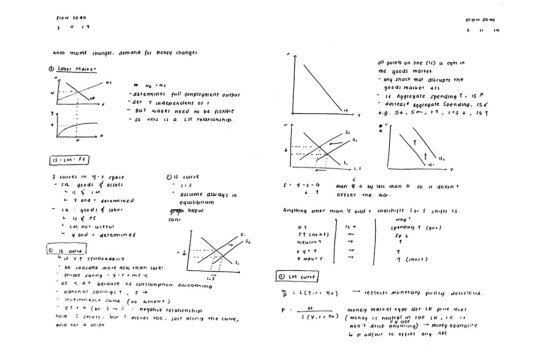
Oral Presentation (e.g. Anthropology)
During classes in which the professor just speaks and doesn’t use much visual material, I listen before I write instead of attempting to write down every single detail mentioned.
Also, I type up my notes instead of handwriting them since the exams are all open-book so I don’t really have to commit things to memory.
Here’s what I do:
Listen for a cue that tells you what this particular part of the lecture will be about (and write it as a heading).
Write down main ideas and their supporting facts/details. If the facts/details come before the main ideas, then I’d usually draw an arrow.
Write down ideas and details from readings in their own section/subsection.
Sometimes, my professor also shows short clips in class, in which case I’d write down the message that I think the clip was meant to convey, as well as things that the professor points out that I didn’t think of on my own.
I’d also look up concepts/ideas/people/events (in real time) that are important to my understanding of the lecture material.
Here’s an example of a Google Docs document from an Anthropology lecture.

Demonstrations and Sample Problems (e.g. Computer Science)
Classes in which the lecture is mainly going through demos and problems are kind of tricky, because you want to know and understand what the professor is doing, but you also don’t want to be writing down every single step that’s being executed. Here’s what I’ve found to be the most effective so far:
If there are any, I import the slides/handout onto OneNote and annotate directly on the slide. If not, I just write down things like definitions, important concepts, and syntax-related things.
I focus on understanding what the professor’s doing with the demo or problem.
I then summarize the steps they took and
Write down comments and points they brought up, e.g. common errors, desirable habits/practices.
Also, these kinds of classes are usually classes in which you’d learn better when you actually do problems yourself, so I definitely learn more when I do assignments and labs than when I’m in class.
Here’s an example from a Web Programming lecture.
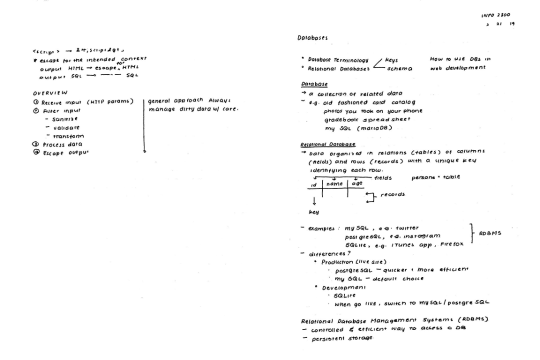
Here’s one from an Object Oriented Programming and Data Structures class. I often draw things to help me visualize the general points.
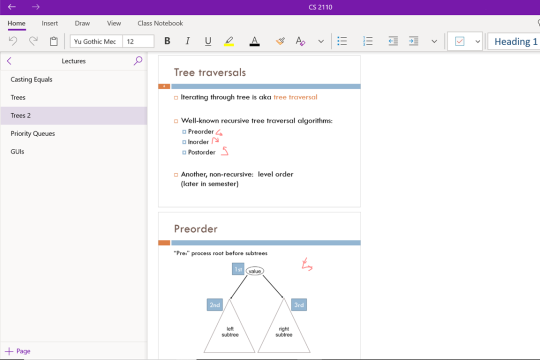
Rewritten Notes
My rewritten notes have definitely changed a lot since high school. Since most of my classes don’t require a lot of memorization, I organize my notes in such a way that they’d be easy to index or find information from. Here are some of the ways I do that:
Establishing a Visual Hierarchy
Having a well-defined hierarchy helps me flow through my notes really well as i read them. It helps me organize information like a mind map without actually making a mind map - I know the big topics and their subtopics and sub-subtopics and details … basically it’s easier to see how these ideas fit together.
But why don’t I just make mind-maps? See, the thing is, a lot of my notes require sequential or linear thinking, e.g. in macroeconomics it might be the sequence of events following a change in the economy, or in computer science it might be a general algorithm for solving a certain type of problem, or it might be proving or deriving a certain equation. These sorts of things just generally don’t work well with mind maps. Instead, establishing a visual hierarchy in my notes helps me organize different ideas while retaining the linear nature of the information.
Here’s what the hierarchy looks like.
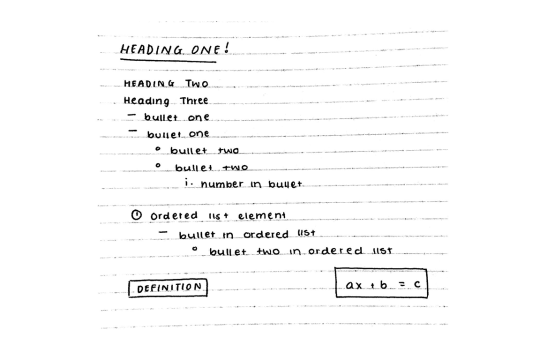
Here is an example from my Web Programming class, which is a purely project-based class, so no prelims or exams. As you can see, I draw rectangles around important terminology so that I can easily find them while I’m working on a project. I also include examples from in-class activities as well as notes on syntax so I have an idea of how to implement certain things. These examples and notes are further grouped by terminology/concept.
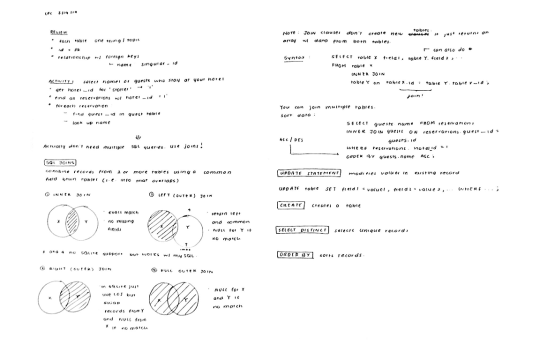
Structuring Them for Easier Flow
My syllabi for my college courses are nowhere near as detailed as the syllabi for my high school courses - those of you who take/have taken Cambridge exams would know. In college, my syllabi are only lists of topics and not what you’re expected to know for each topic. Because of this, I have to find a way to arrange information so that I can achieve the most comprehensive and cohesive understanding of that topic, i.e. so that the flow of my notes is similar to the flow of my thinking.
For example, in my economics notebook, I like to have the details first (e.g. the separate markets: the goods market, the assets market, and the labor market) and then the big picture later (IS-LM-FE). Some people prefer the other way around - seeing the big picture and then going into the details - which I can understand and have done myself for certain topics.
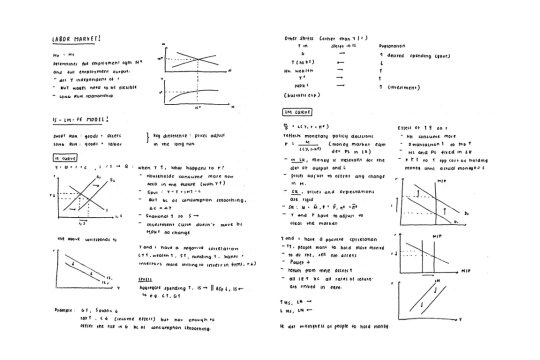
Making Use of Proximity and Spacing
I very much dislike notes without good use of spacing and grouping things together. Keeping related ideas in visual proximity helps your brain (or at least mine) organize this information. It’s also a lot easier to find things and visualize your notes when they’re not just a huge chunk of text.
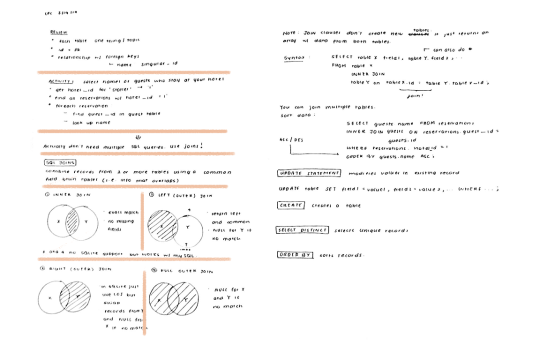
One thing I should probably mention is that I don’t use colored pens anymore because it just takes a lot of time to switch pens and think of a color palette. I also don’t have much use for it. In the past, I used color to help me memorize and group things in different categories, but now, I’ve found that there aren’t a whole lot of categories I need to keep track of, and when I do, I can do so with just one pen but changing the style of the text.
And that’s what my note-taking system currently looks like. It’s working well so far, but I still think there are other things I could try out that might be a better fit.
So yeah, hope this was helpful, and as always, feel free to drop an ask if you have any questions, or even if you have any suggestions or would like to share your note-taking system. Have an awesome week!
10K notes
·
View notes
Text




03.18.19—It’s not spring break without a little bit of scandal, but good to be back on campus
3K notes
·
View notes
Text
how to avoid education burnout
have 3 achievable goals a day: having a laundry list of things to do everyday is super unrealistic, and you just end up feeling bad about yourself because you didn’t accomplish your goals for the day.
leave your sundays open: i love sundays because they’re my day to chill out and catch up on school work that i wasn’t able to finish during the week.
recognize when you’re at your emotional limits: forcing yourself to get work done when you are unable to comprehend your study material does not benefit anyone.
learn how to say no: people will ask you for your time and it will stretch you to the limit, whether it be at your job, in your extracurriculars, or in your personal life. know when to step back and say no.
take care of yourself physically: take breaks, go for walks, shower regularly, get enough sleep, eat healthy, see your friends
celebrate your accomplishments: go out to eat with friends after a big exam, indulge in a night off after a busy week with some netflix and wine
make a study plan beforehand: it can be daunting to see how much work you need to put in to a class or task beforehand, but this allows you to spread your work evenly so you don’t become overwhelmed.
learn how to ask for help: it is very rare that people make it through school, whether it be high school or university or any graduate program, without needing the advice of others or just a kind soul to vent to. find that person.
never forget your hobbies: you will need things that keep you sane. if you love to play music, write, play volleyball, or cook, make you sure you don’t lose these things. they will become your escape when times get tough.
log off from time to time: it is exhausting to be constantly connected to social media and your email. just physically disconnecting from these for a night to take care of yourself can really help you clear your mind.
71K notes
·
View notes
Text
gentle reminders in case you need it:
it’s ok to start “late”
drink water if you haven’t for hours
it’s ok if u need more time than other people
it’s ok to feel what you’re feeling
you have a cute smile
you make people happy
you have plenty of good traits
you are loved
you deserve all the good things
it’s ok if you relapse, it doesn’t make u weak
bad days are just temporary
tomorrow is a new day
you can heal again
I’m proud of you
81K notes
·
View notes
Photo
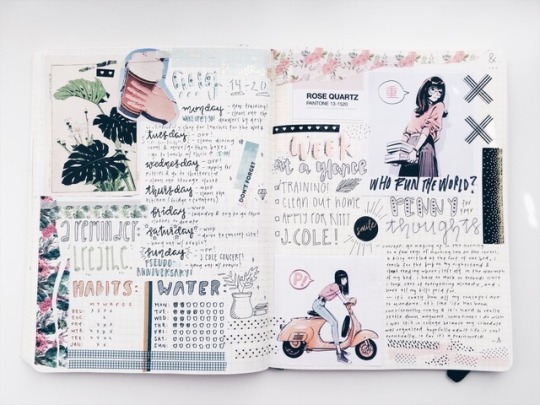
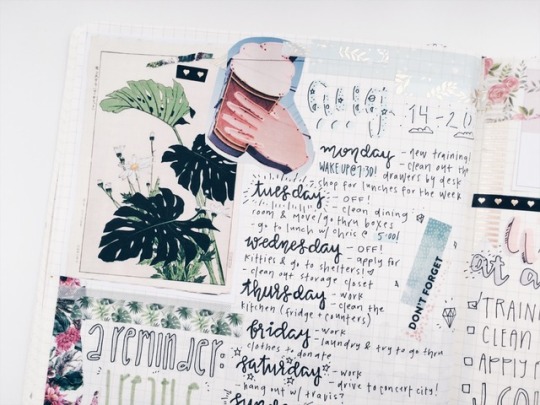
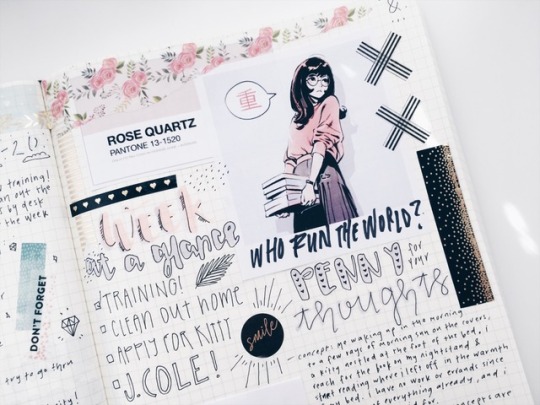
8.18.17+10:25am // slowly getting back to journaling! this spread was fun to do because of all the washi tape i ended up using. good luck on the upcoming semester, everyone! credit: @kuvshinov-ilya/post
6K notes
·
View notes
Text
How to create a study schedule for the holidays
Holidays are just that, holidays. However school and university doesn’t always stop for them. Whilst you’re supposed to be relaxing, there is usually a stack of work waiting to be finished before you go back. After a couple of requests, I’ve put together a small guide to setting up (and following) a holiday study schedule. Keep reading to find out more:
Start early - most students (myself included) generally leave all their work until the last few days of the holidays, then they panic about not having enough time. As soon as you’re able, get started with your schedule. The sooner you start, the sooner all your work is done and you’re free to have a study free holiday. Plus starting early means that you will remember things from your last few classes. If you’ve been off for two weeks and not thought about school, you’ll have to review everything you did before school finish in order to jog your memory!
Write down everything that needs to be done - create a list of everything that you need to finish before you go back to school. I find it easiest to write everything in chronological order and separated by subject. For example, I’d write ‘read chapter 2′, then ‘summarises chapter 2′, then ‘complete review questions’. This way you can see everything you need to cover in the study plan.
Decide how long it will take - estimate how much time all your to-dos will take - maybe a day to type up your class notes, an afternoon to write an essay or an hour to finish a worksheet you didn’t complete. Start fitting in each task around your holiday plans. If you have a spare hour, you could draft that essay you need to write. If you’re spending two hours in the car, print your notes and revise them. Before bed, read the flashcards that you made!
Plan it out - using a calendar or excel, make a schedule for your holiday. It could be daily, weekly, or monthly depending on which way you find it best to plan. Include all the tasks you’d want to complete in that time period. If you get bored easily, break it up into small time periods or change subjects after a few hours! Vary the tasks you need to complete. For instance, no-one wants to spend a day writing essay after essay. Spread them out across a few days and add other small, more fun tasks in between. Here is a study schedule I created which you can download and print! Here is an example of how to fill it out. Design it to what suits you the best, illustrate it or highlight it! Make it something you want to follow.
Take charge of improving your productivity - By planning out your time and setting up a schedule you’re attempting to improve your productivity. Since it is the holidays you don’t want to be spending hours on end finishing work or revising. Find ways to keep yourself accountable for your time. Applications such as Forest or RescueTime are great for helping you stay focused. I also created a post with 10 small tips to improve your productivity. Have a read and try to apply some of them to your studying!
Stick with it - the best way to actually follow your study plan is by being motivated to use it. Put it in a place you see often, for instance near your bed or above your desk. Each morning, see what you need to do and try to get it done. Reward yourself for completing the tasks you need to and cross them off your schedule. However, don’t be afraid to make changes to it. If you can get something do sooner, go ahead but if you miss a day, don’t fret. Either reprint or retype your schedule with new plan!
Take time out - remember that it is your holiday and you don’t need to work 24/7. Have a break, have ten. Take a day to binge watch your favourite show or read that book you’ve wanted too. Don’t feel bad about having some down time, you deserve it!
I hope this helps and you have a lovely holiday! Enjoy the printable I added into the post as well. If you use it, please tag me in any photo you upload! x
9K notes
·
View notes
Text
A “Useless” Degree
It’s something that a lot of us hear - or dread hearing - when we’re starting off in university. “What are you going to do with a useless degree like that?” Some variation of this question will be said, whether it’s by a friend, a family member, or even a perfect stranger who decided that they knew better about your future than you do.
Here’s the thing about academia - all degrees have value, but the amount it’s worth is always going to be up to you. Did you go into your university career with a different major than you have now? I did. This degree was less lucrative, less “useful” than my previous major would have been. But I excelled in the classes, and I enjoyed them, which was not what I was doing in my previous program.
The experience you have while you’re studying at the undergraduate, or even graduate, level does not just have to extend to coursework, but to other things as well. Did you make new friends? Did you uncover an interest you might have not otherwise known about had you not taken that class? Did you overcome a fear? Did you read more books than you ever thought possible? Did you learn something new about yourself? Did you have fun? Did you laugh? Do you have a professor who will stand out in your mind forever because of their literal catchphrase? (Mine was a Medieval professor who started every first day of class with: “There is no use of the F-word in my class! You can fuck all you want, but noooooooooooo feudalism!” - I had him for three different Medieval courses and looked forward to the reactions every single time.)
Your program is there to help you learn and become a better scholar, but it is also to help you grow as a person. To me, there is no such thing as a useless degree - I get more out of my degrees than most people would expect. Do I need to indicate that I have a Creative Writing degree on my CV for my museum work? No, but I claimed it as a double major because I wanted to do it for my own enrichment, my own enjoyment, and if you’re doing something that makes you feel good, then it’s not useless.
If you have fun, your degree is worthwhile.
If you’ve made friends, your degree is worthwhile.
If you have memories you’ll never forget, your degree is worthwhile.
If you learned anything during your program, your degree is worthwhile.
If you found yourself during your program, your degree is worthwhile.
Remember, there is no such thing as a “useless” degree. If you’re enjoying it, if you love it, and you’re studying it because you want to, that’s more than enough for your degree to be worthwhile. Let no one stop you from doing what you love.
7K notes
·
View notes
